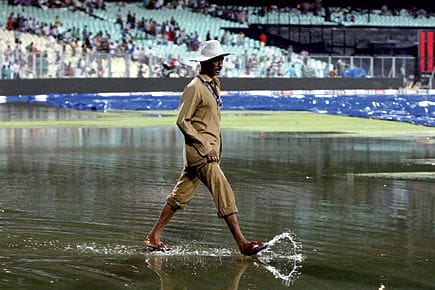Where Will the Water Go?

Linking the IPL with Maharashtra's drought is clever but silly
Politics has a similar structure to business if you consider that the product or service on offer is the politician himself. There are entrepreneurs constantly on the lookout to establish their market. There are mid-level regional set-ups vying for a national presence. There are pan-national corporations. And there are businesses that come on a platter because someone was born to it. Vinod Tawde, leader of the BJP in Maharashtra, is in the middle zone.
That is an uncertain place to be in because you can go both up or down. Creative marketing is required to sustain and build your brand. One of the ways to do that is to piggyback on another brand using a weapon that businesses don't have but politicians have in ample measure—nuisance value. This is one explanation for the letter that Tawde sent recently to Rajiv Shukla, chairman of the Indian Premier League, asking for no matches to be held in drought-stricken Maharashtra because of the enormous amount of water that would be used. It is actually a decently argued case. He says that 60,000 litres of water is required to water one stadium for one day. And multiplying the number of stadiums in Maharashtra by the number of matches, he arrives at a figure of 6.48 million litres of water used.
Shukla's response has been that it is a publicity stunt. That is obviously true. Like all good businessmen, Tawde has seen a successful model in Tamil Nadu Chief Minister J Jayalalithaa forcing a ban on Sri Lankan IPL players in her home state. He just had to tweak it for Maharashtra. It is not a wrong thing to do. It is an established principle that motivation is irrelevant if what is said has merit on its own. Those who speak for the IPL also make the counter-argument that those stadiums would need to be watered anyway for maintenance and so water is not actually conserved if no matches are held. That doesn't make too much sense. If there is merit in not using water for the IPL, then there is merit in stopping the maintenance of stadiums entirely till the monsoon, when the drought comes under control. The principle is the same.
2025 In Review
12 Dec 2025 - Vol 04 | Issue 51
Words and scenes in retrospect
Then there is the interesting phenomenon of how we, the literate English-speaking middle-class, reacted when the exact same logic was applied to Asaram Bapu's use of water in Holi celebration. There was anger and contempt at such profligacy, helped by television images of streams of water being sprinkled onto a joyous crowd. When it comes to cricket, that same constituency begins to nitpick. There is only one explanation for it: sympathies and sensitivities come after self-interest. To a farmer in Marathwada, the worst hit region, there is no quantitative difference between what Asaram and the IPL do with water. The urban elite of Mumbai finds nuances because they like the IPL and don't like Asaram.
But Tawde's stand still has its problems. For instance, the question of what will happen to the 6.48 million litres of water if it is not used for the IPL. Will it change direction and head to Marathwada? The answer is no because the drought itself is also a result of faulty distribution. Maharashtra is currently reeling under a corruption scandal in which thousands of crore allotted for irrigation projects have disappeared without any trace of the canals. A poor monsoon can lead to a drought but it is not the only thing that causes it. It is as much a man-made phenomenon. As the environmental activist Vandana Shiva pointed out in a Times of India interview, over the last 40 years, the area in Maharashtra under sugarcane cultivation has gone up by 10 times. Sugarcane is an insatiably thirsty crop which needs far more water than the rains in that region provide. It is also a politically powerful crop because Maharashtra is ruled by sugar barons. Two state leaders in the BJP—Gopinath Munde and Nitin Gadkari—have many sugar cooperatives under their control. An easy way of controlling drought in Maharashtra is to replace sugarcane with crops that don't need so much rain-fed water. But that is not something that you will see Tawde writing a letter about.
